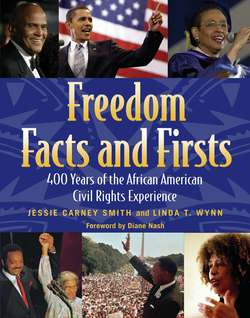Читать книгу Freedom Facts and Firsts - Jessie Carney Smith - Страница 50
На сайте Литреса книга снята с продажи.
Juneteenth
ОглавлениеA portmanteau of the words June and nineteenth, Juneteenth is considered one of the oldest known celebrations commemorating the end of the peculiar institution of slavery in America. Two years after President Abraham Lincoln issued the Emancipation Proclamation, also known as the Day of Jubilee, that became effective on January 1, 1863 (which theoretically freed only those slaves in states under the control of the Confederacy), Union General Gordon Granger’s General Order Number Three finally emancipated approximately 250,000 slaves from thralldom in Texas. In addition to the slaves in Texas, those held in involuntary servitude in the states of Kentucky and Delaware were among the last to gain freedom. The few hundred slaves in Delaware and the tens of thousands of slaves in Kentucky had to wait until the Thirteenth Amendment to the U.S. Constitution was ratified in December 1865 before they were freed. This tardy emancipation gave rise to the enduring American black celebration of Juneteenth.
The news of their freedom was slow to reach many slaves; plantation owners read the proclamation to their slaves over the course of several months following the end of the Civil War. The news evoked a range of celebrations. In Austin, the state capital of Texas, Juneteenth was first celebrated in 1867 under the direction of the Freedmen’s Bureau; it became part of the calendar of public events by 1872. Juneteenth in Limestone County, Texas, gathered “thousands” to be with families and friends. At one time 30,000 blacks gathered at Booker T. Washington Park in Limestone County, Texas (also known as Comanche Crossing), for the event.
The modern Civil Rights Movement of the 1950s and 1960s reinvigorated Juneteenth celebrations, as many African American youths linked the freedom struggle to the historical struggles of their ancestors. Student demonstrators involved in the Atlanta civil rights campaign of the early 1960s wore Juneteenth freedom buttons. In 1968 Juneteenth received another regeneration through the Poor People’s March on Washington, when the Reverend Ralph D. Abernathy called for people of all races, creeds, economic levels, and professions to come to the nation’s capital to demonstrate support for the poor. At the end of the 1970s, Representative Al Edwards, a Democrat from Houston, introduced a bill to make Juneteenth a state holiday. The Texas legislature passed the bill in 1979, and Republican Governor William P. Clements Jr. signed it into law.
Texas made Juneteenth an official holiday on January 1, 1980, and it became the first state to grant Juneteenth government recognition. Several states have since issued proclamations recognizing the holiday, but the Lone Star State remains alone in granting it full state holiday status. Today, Juneteenth is promoted not only as a commemoration of African American freedom, but also as an example of self-development and respect for all cultures. June 19 celebrations reinforce the idea that the Emancipation Proclamation did not bring immediate freedom to American blacks, but that true freedom was a protracted struggle lasting many generations.
Linda T. Wynn
